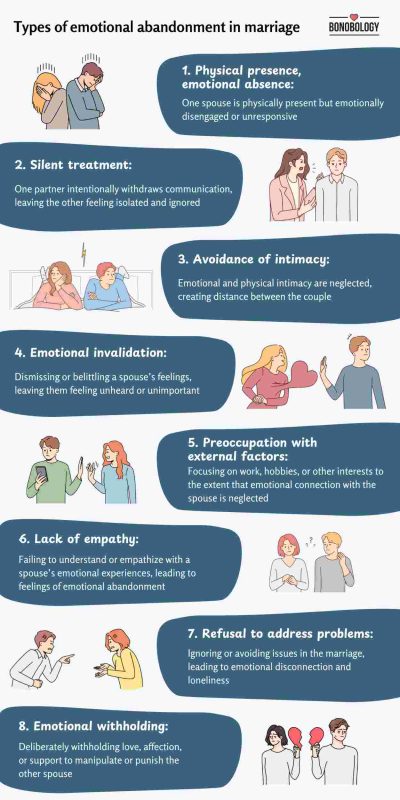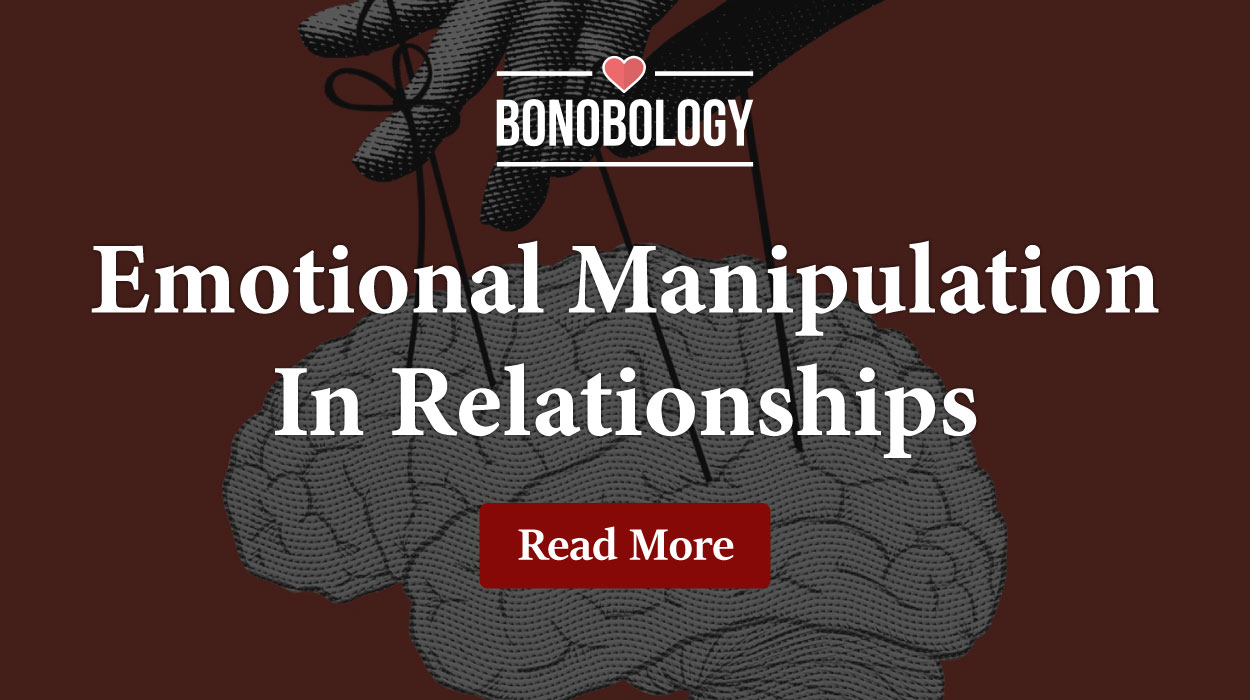Signs, Causes, And Ways To Cope

Sitting on your couch, late into the night, all alone while your spouse is in the bedroom, fast asleep, oblivious to the angst of loneliness you’re grappling with. You crave that intimacy and connection you had hoped marriage would bring your way. But even the thought of making any real effort in that direction makes you shudder and shut down emotionally. The chasm continues to grow wider. If that sounds relatable, you’re dealing with emotional abandonment in marriage.
There is nothing more heartbreaking than having the person you chose to share your life with right next to you and yet not being able to reach out to them. Research shows if allowed to fester, this pattern of alienation and emotional suppression can take a toll on the psychological well-being of the people involved.
That’s why it’s important to recognize emotional abandonment in a relationship and actively work toward breaking the vicious cycle that keeps pulling partners apart. To that end, let’s look at the signs, causes, and effects of emotional abandonment and how to cope with it.
What Is Emotional Abandonment In Marriage?
Given the complexity of this issue, we must get the basics right so that you can be sure that the loneliness in marriage you’re struggling with amounts to emotional abandonment and isn’t a manifestation of an altogether different issue. So, what is emotional abandonment in marriage? It refers to the pattern of one spouse becoming emotionally distant or detached, leaving the other feeling lonely, rejected, or abandoned.
Unlike spousal abandonment, emotional abandonment is subtle and doesn’t require a couple to be physically apart from one another. In fact, more often than not, it happens while a couple still shares a life and is characterized by a lack of intimacy, communication, and emotional connection, leading to feelings of isolation and neglect.
To shed light on how emotional abandonment in a relationship takes hold, counseling psychologist Devaleena Ghosh shares the story of a couple she counseled. Let’s call them Sarah and David. Married for 12 years, their life together was smooth as can be when the 2008 recession cost David his job. It was a few months before he could find another, and their savings were wiped out just meeting everyday needs.
Afraid of ever having to contend with a similar fate ever again, David threw himself into his new job, working long hours, often weekends and holidays. Their relationship began to change. David was so consumed with thriving professionally that it took his focus off Sarah altogether. They rarely talked or spent any quality time together. Their once vibrant relationship turned into a routine of short, surface-level exchanges.
Meanwhile, Sarah was also juggling her work and most of the household duties. She began to feel lonely, neglected, and taken for granted. Whenever she tried to talk to David about it, he would brush her off. As the emotional distance grew, Sarah became increasingly frustrated and isolated. After many failed attempts at reconnecting with David, she decided on a trial separation. There was no point in living in the same house and sharing a life with someone who barely recognized her existence, she felt. It was this jolt that opened David’s eyes to what a shambles their marriage was. Eventually, they went into therapy and were able to work toward rebuilding trust and emotional intimacy.
Unmet emotional needs threatening a couple’s future together is hardly uncommon or unexpected. Experts agree that emotional abandonment can cause long-lasting harm in a marriage, often leading to depression, anxiety, or feelings of unworthiness in the abandoned spouse.
Related Reading: I Am Feeling Trapped In My Marriage
Dr. John Gottman, a renowned relationship expert, emphasizes the role of emotional responsiveness in relationships, and says, “When couples turn toward each other, they build an emotional bank account. When they turn away, they deplete it.” According to Gottman, emotional abandonment happens when couples consistently “turn away” from each other, failing to meet emotional bids for connection. This creates a disconnect that, if unaddressed, can lead to a relationship breakdown.
Echoing the same thought, Dr. Sue Johnson, the creator of Emotionally Focused Therapy (EFT) writes, “Emotional abandonment is often the result of unresolved attachment injuries. When we do not feel safe or valued in our emotional connection with our partner, we disengage to protect ourselves.”
Types of emotional abandonment in a relationship
Emotional abandonment can take different forms, depending on the underlying cause as well as the personalities of the people involved and the dynamics of the relationship between them. Here is a quick roundup of the different types in which emotional abandonment in a relationship manifests:

Differences between emotional abandonment and emotional neglect in a marriage
A similar issue that couples sometimes have to contend with is emotional neglect in marriage. While the underlying causes and manifestations overlap, the two are not the same. Emotional abandonment is often a conscious choice and its impact can be far more grievous. To be sure whether it’s neglect or abandonment you’re dealing with, take a look at the key differences between the two:
| Emotional Abandonment | Emotional Neglect |
|---|---|
| Emotional withdrawal where one partner detaches or distances themselves, making the other feel isolated or rejected | A pattern of failing to meet a partner’s emotional needs, leading to emotional deprivation without intentional withdrawal |
| The abandoned partner feels rejected, and unwanted, and often experiences deep loneliness or distress | Usually unintentional and results from a lack of awareness or attention to emotional needs |
| The abandoned partner feels rejected, unwanted, and often experiences deep loneliness or distress | The neglected partner feels ignored or uncared for, but may not experience outright rejection |
| One partner is emotionally unavailable and disinterested in rekindling the connection. | Both partners may still desire emotional connection but fail to understand or meet each other’s emotional needs. |
Related Reading: Emotional Abuse Checklist – 18 Devastating Signs
Causes Of Emotional Abandonment In Marriage
No one just wakes up one day and chooses spousal abandonment, even the emotional kind. People come together in marriage with the hope of companionship, love, and togetherness. So what brings a couple to a point where one of them checks out emotionally and the other is left grappling with loneliness in marriage? To understand, let’s look at these common causes of emotional abandonment in marriage:
1. Unresolved conflict

Leaving conflicts unresolved causes pain, hurt, and disappointment to build up over time, which can, in turn, lead to emotional distancing. These unresolved issues can turn even the most benign arguments or disagreements into breeding grounds for hostility, triggering resentment and emotional withdrawal.
When repeated often enough, this cycle impedes a couple’s ability to tackle issues head-on, causing a breakdown in emotional intimacy. Dr. Gottman says, “Unresolved conflicts are like toxins in a marriage. When partners avoid or ignore difficult conversations, it leads to emotional estrangement and feelings of abandonment.”
2. Lack of emotional communication
An inability to communicate openly and be vulnerable with each other is a major cause of emotional abandonment. When one or both spouses shy away from sharing their feelings, frustrations, or emotional needs, it creates a disconnect, which leads to a lack of emotional transparency. In such an environment, trust and closeness cannot be fostered.
“Emotional communication is the lifeblood of a marriage. When couples stop expressing their feelings and concerns, they risk creating a deep emotional void.”
Dr. Sue Johnson, Creator of Emotionally Focused Therapy (EFT)
3. Busy lifestyles and prioritizing other commitments
When life gets busy and it feels like everything from your work to your children, household responsibilities, social commitments, and hobbies is pulling you in different directions, it’s easy to put your relationship with your spouse on the back burner because of the inherent sense of security that they’re always going to be there. However, it doesn’t quite work that way.
If you keep prioritizing external obligations over your relationship, you will invariably end up neglecting your spouse’s emotional needs. This can trigger feelings of abandonment and cause the emotional connection to deteriorate. As psychotherapist Ether Perel writes in her book, Mating in Captivity, “Couples often fall into the trap of living parallel lives, where the demands of work, children, and personal interests take precedence over the marriage. This creates an emotional distance that can feel like abandonment.”
4. Emotional burnout caused by stress

Chronic stress from work, financial strain, or family issues can cause emotional burnout. When a partner is overwhelmed by stress, they may retreat emotionally, becoming less available to their spouse. This withdrawal can result in one’s spouse feeling emotionally abandoned and lead to relationship burnout. Clinical psychologist Dr. Alexandra Solomon says, “When people experience high levels of stress or burnout, they may not have the emotional resources left to give to their partner, leading to feelings of emotional isolation.”
5. Unhealed emotional trauma
Our past greatly determines how we behave in our relationships. Any unhealed emotional trauma, be it from childhood or past relationships, can cause emotional blockages in marriage. The person carrying such emotional wounds may find it difficult to show vulnerability and thus form an authentic connection with their significant other. They might unconsciously distance themselves from their spouse to protect themselves, leaving them feeling abandoned.
Explaining the impact of unresolved trauma on marriages, Dr. Bessel van der Kolk, author of The Body Keeps the Score, writes, “Unresolved trauma often plays a silent role in marriages. It creates emotional walls, making it hard for spouses to connect on a deeper level and leaving one partner feeling abandoned.”
9 Signs Of Emotional Abandonment In Marriage
Now that we’ve talked about what is emotional abandonment in marriage and its triggers, let’s shift our attention to another significant aspect: how it manifests. While different people may exhibit their emotional detachment from their partners differently and different people may experience loneliness in marriage to varying degrees, some common patterns do emerge. These are best summed up in these 9 tell-tale signs of emotional abandonment in marriage:
1. Frequent feelings of loneliness
A key sign of emotional abandonment is loneliness in marriage. Even when you’re physically with your partner, they may feel distant and unapproachable. Despite sharing a home and daily routines, you may feel like you’re going through life like you’re on your own. This dichotomy of being married but feeling single indicates that you feel isolated and left to fend for yourself.
Dr. Johnson says, “The most painful form of loneliness is feeling alone in a relationship, where emotional disconnection creates an internal sense of isolation.”
Related Reading: Why Am I So Depressed And Lonely In My Marriage?
2. Lack of emotional support
Nothing says spousal abandonment than not having your life partner by your side when you need them the most. Dr. Gottman says, “Emotional support is the backbone of a healthy relationship. When it’s missing, partners feel undervalued and abandoned.” So, if you often feel that your partner fails to provide support during difficult times or avoids engaging in emotional conversations, it’s one of the signs of unloving wife/husband who seems to have given up on you emotionally.
3. Reduced physical and emotional intimacy

Of all the different forms of intimacy in a relationship, physical and emotional are perhaps the most crucial to cement a couple’s bond and keep it strong. However, when emotional abandonment in a relationship begins to take hold, these forms of intimacy begin to decline as well. This could manifet as,
- Reduced displays of affection like hugging and kissing
- Decline in sexual intimacy
- Lack of meaningful conversations
4. Avoiding conflict and difficult conversations
As much as we’d like marriage to be a bed of roses with a side of rainbows and sunshine, the hard truth is that conflict and rough patches are par for the course when you embark on a lifelong journey with another person. In a healthy marriage, couples find a way to address issues as they arise, have difficult conversations, and work through their problems.
However, when there is an emotional disconnect, instead of confronting disagreements or conflicts, one spouse may shut down, making the other feel ignored or unimportant.
“When couples avoid conflict, they also avoid the opportunity to repair emotional wounds, which fosters emotional abandonment over time.”
Dr. Terri Orbuch, relationship expert
5. Apathy and indifference
Do you often feel that your spouse is indifferent to your emotional or personal struggles? Do you experience emotional invalidation in your marriage? Do you find yourself lamenting, “My wife/husband dismisses my feelings like they don’t matter”? Does your partner go about their day like nothing’s happened even when you’re visibly emotionally distressed? Do they go to sleep leaving you in tears after a big argument?
These are classic displays of apathy and indifference that indicate that your partner has become so emotionally withdrawn that they no longer care about you and your feelings. This can be a particularly distressing sign of emotional abandonment that can leave you thinking, “My wife/ my husband doesn’t love me anymore.” Psychologist Dr. Harriet Lerner says, “Apathy in relationships is a major red flag. It signifies that one or both partners have emotionally checked out, often leaving the other feeling abandoned.”
Related Reading: Indifference In Relationships — Causes, Signs And Coping Tips
6. Your spouse is emotionally withdrawn during difficult times

When tough times come calling, you expect your partner to be there by your side, as a rock-solid source of support. Just as you want to be there for them. Be it a financial crisis, a death in the family, dealing with sickness, professional hurdles, or any other crisis, surviving it becomes easier when partners lean on each other.
However, in an emotionally abandoned marriage, one spouse may withdraw during tough times. You may feel uneasy approaching your partner about how to deal with challenges or find yourself walking on eggshells around them during difficult times because you don’t know how they’d react.
This can intensify feelings of rejection and neglect. Clinical psychologist Dr. Alexandra Solomon says, “Emotional withdrawal during difficult times is often a defense mechanism, but it leaves the partner feeling unsupported and disconnected.”
7. Decreased interest in daily life
Dr. Gottman says, “When partners stop showing interest in each other’s inner world, it’s a sign that emotional abandonment is taking hold.” When a woman shuts down emotionally or a man checks out a relationship emotionally, this dwindling interest becomes inevitable. Your partner may stop asking questions or showing curiosity about your feelings, dreams, or aspirations. Or they may exhibit complete indifference and disinterest even when you share your day-to-day experiences, struggles, achievements, or future plans.
Related Reading: Why Is My Husband Not Interested In Me? 8 Reasons And Tips To Cope
8. Feeling unvalued
One of the most telling signs of emotional abandonment in marriage is that you constantly feel unvalued and unappreciated. This is when thoughts like, “My wife/my husband doesn’t love me anymore” or “My wife/husband dismisses my feelings like I don’t matter”, begin to circle your mind.
Dr. Gary Chapman, the author of The 5 Love Languages, says, “Feeling unvalued is a core experience of emotional abandonment, where one partner feels their worth is no longer recognized in the relationship.” This feeling often stems from a lack of acknowledgment or emotional investment from one’s spouse.
9. Emotional numbness

The constant rejection from your partner, lack of recognition, absence of affection and meaningful engagement, and feeling of loneliness in marriage can make the emotionally abandoned spouse shut down as a way to protect themselves. If repeated attempts to reconnect with your spouse have failed, it is only natural that you will begin to hesitate to reach out, open up, and be vulnerable.
This is one of the most worrying signs of emotional abandonment in marriage because it indicates you’ve resigned to the distance. Dr. Bessel van der Kolk, Author of The Body Keeps the Score, says, “Emotional numbness is often the result of repeated emotional neglect, where the partner gives up on trying to connect, believing that nothing will change.”
Related Reading: 9 Signs You Are In An Emotionally Draining Relationship
Effects Of Emotional Abandonment In Marriage
Emotional abandonment in marriage is often a gradual process that erodes emotional intimacy over time. However, if you and your partner fail to recognize the red flags in time and allow this distance to grow, the impact on your marriage can be devastating. Here are the most common effects of emotional abandonment in marriage:
1. Loneliness
The partner experiencing abandonment struggles with feelings of loneliness in marriage and feels as though they are navigating life alone.
2. Low self-esteem and self-worth

Emotional abandonment can lead to feelings of inadequacy and low self-esteem. If your spouse has given up on you emotionally, you may start to believe you are unworthy of love or attention. This can slowly chip away at your self-esteem and sense of self-worth.
3. Risk of anxiety and depression
The effects of emotional abandonment in marriage can extend to your mental health as well, putting you at higher risk of issues such as anxiety and depression. When prolonged, the constant feelings of rejection, loneliness, and worthlessness can take a toll on your emotional well-being.
Related Reading: “My Anxiety Is Ruining My Relationship”: 6 Ways It Does And 5 Ways To Manage It
4. Breakdown of trust
If you’re dealing with a breakdown of emotional support and connection, trust begins to erode. You may begin to feel you can no longer rely on your spouse, which, in turn, creates a deeper emotional divide and leads to insecurity in the relationship.
5. Resentment and anger
Of course, constantly being rejected, ignored, or shot down by your spouse can make you resent them. When this emotional disconnection is allowed to fester, resentment can turn into bitterness and anger, further escalating the hostility in the marriage.
6. Risk of infidelity
When your need for intimacy and connection is not met within your marriage, you may seek it outside the marriage. The lack of fulfillment within the relationship may push you or your spouse or both to pursue validation and intimacy elsewhere, exposing your marriage to the risk of extramarital affairs.
Related Reading: Expert Lists Out 9 Effects Of Cheating In A Relationship
7. Potential for separation or divorce
If emotional abandonment persists and is left unaddressed, it can lead to the breakdown of the marriage. Like Sarah, who moved out after getting tired of her husband’s indifference toward her, you, too, may begin toying with the idea of cutting the cord and turning over a new leaf when all your efforts to reconnect fall flat.

How To Cope With Emotional Abandonment In Marriage — 7 Expert-Backed Tips
Given the extent of damage emotional abandonment can cause, it can bring about feelings of dejection and hopelessness. So, before I take you through expert-backed tips on how to cope with emotional abandonment in marriage, allow me to share a story that demonstrates it’s possible to bounce back from this abyss.
Emily and Jake had been married for seven years when suspicions of infidelity rocked their relationship, driving them to the brink of separation. It all started when after seeing some rather cryptic texts on Jake’s phone, Emily started accusing him of infidelity without any proof. At first, Jake tried to placate her suspicions. But Emily found it hard to believe him.
She started snooping on him, demanded to check his phone, and tracked his whereabouts, day in and day out. After a while, Jake shut down and withdrew completely. This only further fueled Emily’s suspicions. “My husband doesn’t love me anymore,” she rued. Things got so out of hand that they not only disengaged emotionally but barely spoke to each other anymore.

Soon, Emily reached a breaking point and felt she couldn’t continue in a relationship where she felt emotionally abandoned. Jake, on the other hand, felt she displayed all the signs of unloving wife and was purposefully hurting him. Ultimately, they decided to give their marriage a chance by seeking professional help.
Through acknowledgment of the problem, continued efforts at improving communication, healthy boundary setting, and exercises to rebuild intimacy, they were able to reconnect emotionally. It took several months but their marriage became stronger, with both of them feeling more valued and supported. If you are in similar dire straits, don’t lose hope. It’s possible to reverse emotional abandonment. Here are a few steps that can help:
Related Reading: 9 Signs Of Bad Communication In A Relationship
1. Acknowledge and communicate your feelings
The first step in coping with emotional abandonment is acknowledging the feelings of disconnection and loneliness in marriage. It’s crucial to express these emotions to your partner openly and honestly, even if it’s uncomfortable. On the importance of communication in a relationship, Dr. Gottman says, “Healthy relationships are built on open communication. Expressing your feelings, even the difficult ones, is essential for emotional connection.”
2. Focus on self-care
Spousal abandonment can take quite a toll on your emotional well-being. To protect yourself, it’s important to prioritize emotional balance and inner strength by engaging in self-care activities like,
- Exercise
- Mindfulness
- Pursuing hobbies
Researcher and author Dr. Brené Brown says, “When we prioritize our self-care, we build resilience, making it easier to cope with emotional challenges in relationships.”
3. Work toward rebuilding emotional intimacy gradually

Psychologist Dr. Harriet Lerner says, “Intimacy grows through small, consistent acts of emotional responsiveness. By being present for each other in everyday moments, couples can reconnect.” When dealing with emotional abandonment in marriage, you cannot lose sight of the fact that your bond has taken a hit and resolution cannot happen overnight.
Instead of expecting an immediate change, take gradual steps to rebuild emotional intimacy. This might involve,
- Spending quality time together
- Engaging in meaningful conversations
- Being more present for each other emotionally
4. Set boundaries and manage expectations
It’s important to set healthy boundaries and communicate your emotional needs clearly to your partner. Dr. Henry Cloud, author of Boundaries, says, “Clear boundaries define what is acceptable and expected in relationships. They are essential for protecting emotional well-being and fostering intimacy.”
You must make sure your partner understands what you expect emotionally and what behaviors make you feel emotionally abandoned. This can prevent future misunderstandings.
Related Reading: What Is Forgiveness In Relationships And Why Is It Important
5. Practice forgiveness and patience
Coping with emotional abandonment requires patience, as rebuilding trust and connection can take time. Forgiving your partner for past emotional neglect needs to be a part of the healing process, as long as you’re both on the same page and committed to working on the relationship.
“Forgiveness doesn’t mean forgetting the hurt, but it allows couples to let go of resentment and rebuild emotional trust.”
Dr. Gary Chapman, Author of The 5 Love Languages
6. Reconnect through shared activities
Therapist Dr. Laura Berman says, “Shared activities create positive interactions and memories, which help reinforce the emotional connection between partners.” Whether it’s cooking together, going for walks, or pursuing a joint interest, doing things as a team can foster bonding and help break emotional barriers.
7. Seek professional help
Marriage counseling or individual therapy can be an effective way to address emotional abandonment. Dr. Johnson explains, “Counseling creates a safe space where couples can explore their emotions and learn how to rebuild the emotional bond.” A trained therapist can help you and your spouse understand the root causes of the disconnection and provide strategies to reconnect emotionally. If you’re struggling with emotional abandonment and looking for help, skilled and experienced counselors on Bonobology’s panel are here for you.
Related Reading: 9 Ways To Fix A Broken Marriage And Save It
Key Pointers
- Emotional abandonment happens when one spouse becomes emotionally distant or detached, leaving the other feeling lonely, rejected, or abandoned
- The causes can range from unresolved conflict to lack of communication, busy lifestyles, and unhealed trauma
- Signs of emotional abandonment include feelings of loneliness, lack of emotional support, reduced intimacy, apathy, and emotional numbness
- If allowed to fester, emotional abandonment can result in low self-esteem and self-worth, risk of anxiety and depression, risk of infidelity, and even breakdown of marriage
- To deal with emotional abandonment, you must acknowledge the problem, focus on self-care, work toward improving communication, and rebuilding intimacy
- If necessary, don’t hesitate to seek professional help. A trained therapist can help you and your spouse understand the root causes of the disconnection and provide strategies to reconnect emotionally
Final Thoughts
Emotional abandonment neither takes hold in a vacuum nor does it happen overnight. It’s a gradual process fueled by a string of incidents that slowly pull you and your partner apart. The best resource is to prevent this emotional distance from taking root by staying vigilant, checking in with your partner often, and not sweeping issues under the rug. However, if you do find yourself in a situation where your spouse seems to have abandoned you emotionally, don’t lose heart. As long as both you and your partner are committed to making the relationship work, you can recover from this setback and find a way back to each other.
How To Deal With A Negative Spouse – 15 Expert-Backed Tips
3 Key Skills To Save Your Marriage & Stop Divorce
Roommate Marriage – Signs And How To Fix It
Share Feedback
Ask Our Expert
You must be Logged in to ask a question.





It’s an awesome paragraph in favor of all thee online users;
thbey will obtyain benhefit from itt I aam sure.
Thhis post is worth everyone’s attention. Wheere can I find outt more?